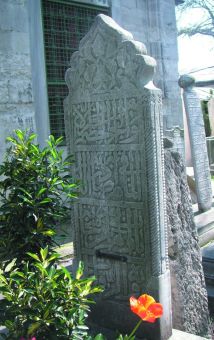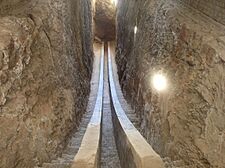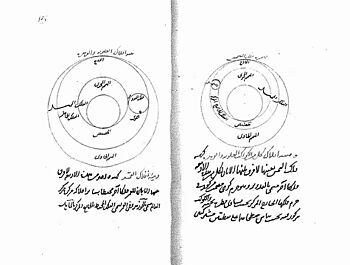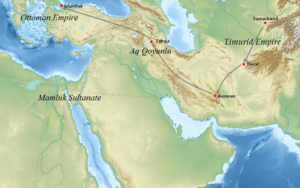Ali Qushji facts for kids
Quick facts for kids Ala al-Dīn Ali ibn Muhammed |
|
|---|---|
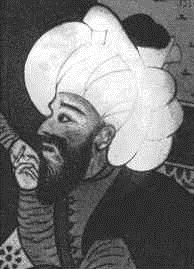 |
|
| Religion | Islam |
| Denomination | Sunni |
| Personal | |
| Born | 1403 CE Samarkand, Timurid Empire (now Uzbekistan) |
| Died | 1474 CE Constantinople, Ottoman Empire (now Turkey) |
| Influenced | Mirim Çelebi, Muhammad al-Qunawi |
Ali Qushji (born Ala al-Dīn Ali ibn Muhammed) was a brilliant scientist from the 1400s. He was born in 1403 and passed away on December 18, 1474. His last name, Qushji, means "falconer" in Turkish. This is because his father was a royal falconer.
Ali Qushji was a true all-rounder. He was a theologian (someone who studies religion), a jurist (a legal expert), an astronomer (who studies stars and planets), a mathematician, and a physicist (who studies how things work). He was born in the Timurid Empire but later moved to the Ottoman Empire.
He was a student of Ulugh Beg, a famous astronomer and ruler. Ali Qushji is best known for his work in astronomical physics. He showed that astronomy could be studied on its own, separate from philosophy. He also found evidence that the Earth spins. He wrote about this in his book, Concerning the Supposed Dependence of Astronomy upon Philosophy.
Ali Qushji also helped with Ulugh Beg's important work, Zij-i-Sultani. He helped start the Sahn-ı Seman Medrese, which was one of the first big centers for learning Islamic sciences in the Ottoman Empire. He wrote many scientific books and textbooks on astronomy too.
Contents
Ali Qushji's Life Story
Early Life and Studies
Ali Qushji was born in 1403 in Samarkand. This city is now part of Uzbekistan. His full name was Ala al-Dīn Ali ibn Muhammed al-Qushji.
He learned from famous scholars like Qazi zadeh Rumi and Ghiyāth al-Dīn Jamshīd Kāshānī. He traveled to Kerman, Iran to do research. There, he studied storms in the Oman sea.
He wrote two important books in Kerman: Hall-e Eshkal-i Ghammar (Explanations of the Periods of the Moon) and Sharh-e Tajrid. Later, he went to Herat and taught astronomy to Molla Cami in 1423.
After teaching for a while, he returned to Samarkand. He showed his work on the Moon to Ulugh Beg. Ulugh Beg was so impressed that he read the whole book while standing! Ulugh Beg then asked Ali Qushji to work at the Ulugh Beg Observatory. Ali Qushji worked there until Ulugh Beg passed away.
Moving to Constantinople
After Ulugh Beg's death, Ali Qushji traveled a lot. He went to Herat, Tashkent, and finally Tabriz. Around 1470, the ruler Uzun Hasan sent him to the Ottoman Sultan Mehmed II.
Ali Qushji chose to go to Constantinople (now Istanbul) instead of staying in Herat. This was because Sultan Mehmed II was very welcoming to scientists and thinkers.
In Constantinople, Ali Qushji continued his important work. His grandson, Ghutb al-Dīn Muhammed, later had a son named Mirim Çelebi. Mirim Çelebi would also become a great mathematician and astronomer.
Ali Qushji wrote a book in Persian called "risalah dar hay’at" for Sultan Mehmed II. He also wrote "Sharh e resalye Fathiyeh" and "resalye Mohammadiye" in Arabic. These books were about mathematics. He also finished "Sharh e tejrid," a commentary on Nasir al-Din al-Tusi's "Tejrid al-kalam." This work is known as "Sharh e Jadid" among scientists.
Ali Qushji's Discoveries in Astronomy
Ali Qushji made improvements to Nasir al-Din al-Tusi's models of planets. He even created a new model for the planet Mercury. He was part of the team at the Samarqand observatory that worked with Ulugh Beg. They helped create the Zij-i-Sultani, a very important set of astronomical tables.
Besides his work on the Zij, Ali Qushji wrote nine books on astronomy. Two were in Persian, and seven were in Arabic. Later, in 1650, two of his works were translated into Latin. These were his Tract on Arithmetic and Tract on Astronomy.
His Big Idea: Astronomy Without Philosophy
Ali Qushji's most important astronomy book is Concerning the Supposed Dependence of Astronomy upon Philosophy. At that time, many people believed that astronomy had to follow the rules of Aristotle's philosophy. Aristotle thought the Earth was still and everything moved in perfect circles around it.
But Ali Qushji disagreed. Influenced by Islamic thinkers, he said that astronomy should be its own science. It should rely on observations and math, not on old philosophical ideas. This was a big step! It meant astronomers could explore new ideas, like whether the Earth actually moves.
He looked for evidence that the Earth spins. He observed comets and concluded that a moving Earth was just as possible as a stationary Earth. He based this on what he saw, not just on old ideas.
Before him, al-Tusi had noticed that falling objects and heavenly bodies moved in similar ways. But al-Tusi still thought astronomers needed philosophers to explain some things. Ali Qushji went further. He said astronomers didn't need Aristotle's physics at all. They could create their own rules based on observations.
This idea was a "conceptual revolution." It was a new way of thinking about science. It happened before the Copernican Revolution in Europe in the 1500s. Ali Qushji's ideas about Earth's motion were similar to what Nicolaus Copernicus later proposed. It's possible they both used the earlier work of Nasir al-Din al-Tusi.
Ali Qushji's Writings
Astronomy
- Sharḥ e Zîj e Ulugh Beg (In Persian)
- Risāla fī Halle Eshkale Moadeleye Ghamar lil-Masir (Arabic)
- Risāla fī aṣl al-Hâric yumkin fī al-sufliyyeyn (Arabic)
- Sharḥ ʿalā al-tuḥfat al-shāhiyya fī al-hayāt (Arabic)
- Risāla dar elm-i ḥeyāt (In Persian)
- Al-Fatḥīya fī ʿilm al-hayʾa (in Arabic)
- Risāla fi Hall-e Eshkal-i Ghammar (in Persian)
- Concerning the Supposed Dependence of Astronomy upon Philosophy (Arabic)
Mathematics
- Risāla al-muḥhammadiyya fi-ḥisāb (In Arabic)
- Risāla dār ʿilm al-ḥisāb: Suleymaniye (Arabic)
Theology and Law (Kalam and Fiqh)
- Sharh Tajrid al-I'tiqad
- Hashiye ale't-Telvîh
- Unkud-üz-Zevahir fi Nazm-al-Javaher
Mechanics
- Tazkare fi Âlâti'r-Ruhâniyye
Linguistics
- Sharh Risâleti'l-Vadiyye
- El-Ifsâh
- El-Unkûdu'z-Zevâhir fî Nazmi'l-Javâher
- Sharh e'Sh-Shâfiye
- Resale fî Beyâni Vadi'l-Mufredât
- Fâ'ide li-Tahkîki Lâmi't-Ta'rîf
- Resale mâ Ene Kultu
- Resale fî'l-Hamd
- Resale fî Ilmi'l-Me'ânî
- Resale fî Bahsi'l-Mufred
- Resale fî'l-Fenni's-Sânî min Ilmihal-Beyân
- Tafsir e-Bakara ve Âli Imrân
- Risâle fî'l-İstişâre
- Mahbub-al-Hamail fi kashf-al-mesail
- Tajrid-al-Kalam
See Also
- List of Muslim scientists and scholars
 | Jessica Watkins |
 | Robert Henry Lawrence Jr. |
 | Mae Jemison |
 | Sian Proctor |
 | Guion Bluford |


